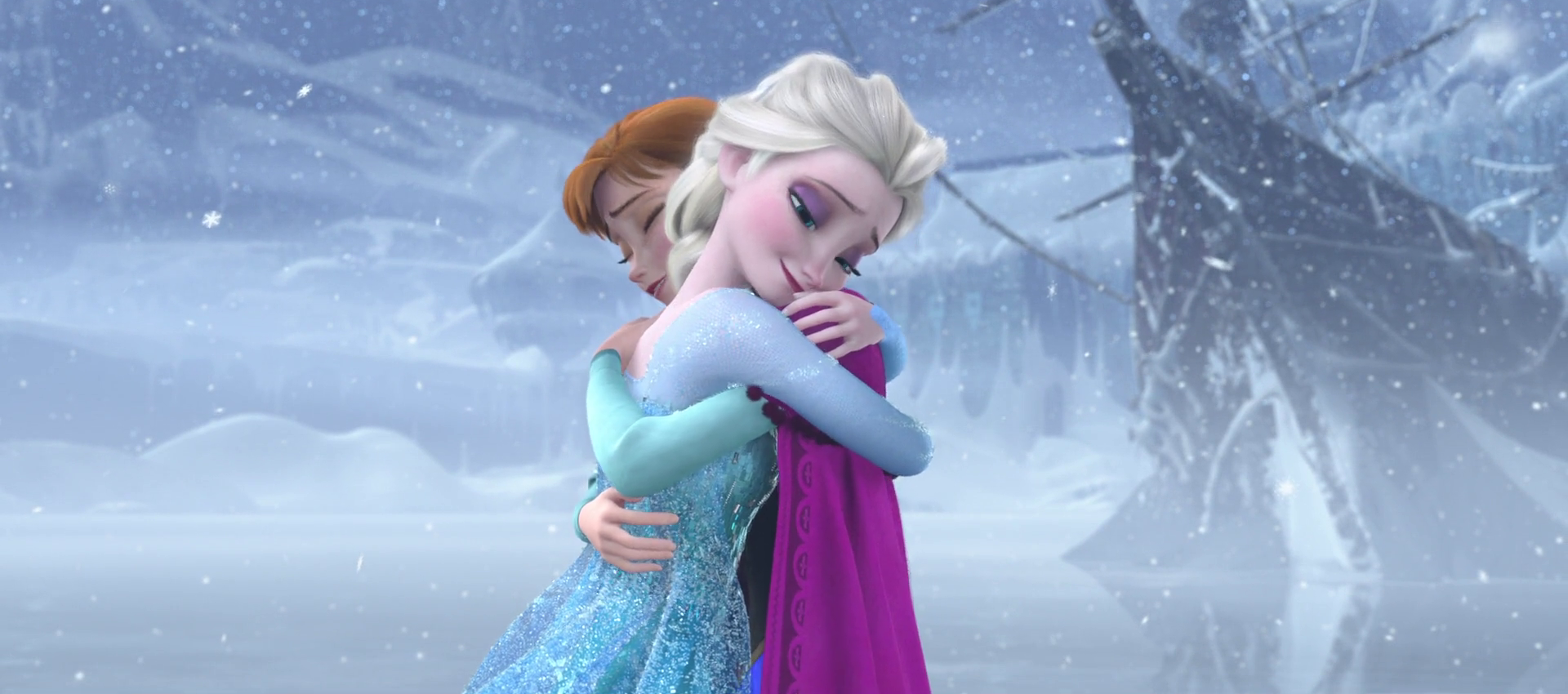
MPAA Rating: PG | Rating: ★★★½
Release year: 2013
Genre: Adventure, Animated, Comedy, Romance Director: Buck, Lee
Disney is reconstructing its princess romantic identity. Beginning with Tangled, then Pixar’sBrave, and now with this past year’s Frozen–a wonderfully charming film featuring twoprincesses, sisters caught up in a magical adventure of danger and love–the concepts of love and femininity are taking some significant and positive shifts. In Frozen, the elder sister, Elsa, has the magical power to control ice and snow. This power proves to be dangerous after an incident where her younger sister, Anna, is hit with a blast from Elsa’s ice. Her parents make the difficult choice to hide Elsa away from public life, even isolating her away from Anna, never mentioning the secret power she holds. When Elsa turns twenty-one and can begin to officially rule her kingdom as queen, her magic is exposed and she finds herself ostracized by all around her. On the same day, naive Anna falls in love with Hans, a handsome prince attending the ceremonies who proposes they get married. After Elsa’s power covers the country with a layer of snow and ice, a newly engaged Anna embarks on a journey into the snowy world to be reconciled to Elsa and save both her sister and the kingdom.
If you look closely at the portrayal of gender roles and romance in Disney princess movies, you can begin to see the underlying influence and ethos of the cultural milieu. For example, Sleeping Beauty–one of my personal favorites–has a beautiful and delicate young female heroine in princess Aurora. For almost the entirety of the film, she is hidden away from the evils of the world or passively asleep/dead until the handsome and masculine prince can combat the evil and awaken her with true love’s kiss, despite having only one brief encounter with Aurora in a romp through the forest. What message does this tell us about femininity and masculinity? About romance and true love? Look at Snow White, a 14-year-old girl who is valued primarily for her physical beauty by the jealous queen, causing Snow White to hide in the forest from danger, protected only by her newfound dwarfish companions. She succumbs to the temptation of a poisoned apple given to her by the queen and can only be saved by an unnamed prince (who needs to know a guy’s name when it’s true love?) and his kiss. Delicate, passive young princesses who wait around for men to save them from the danger, which is ultimately from older women who crave their youthful physical beauty.
But then there’s Rapunzel in Tangled, a young woman on a search for identity and autonomy from her overprotective mother, who falls in love not with a prince charming, but with a handsome rogue and thief, Flynn Rider. And Merida, a true princess of Scotland who manages to navigate the adventures of of Brave without a love interest at all, ultimately becoming queen of her people. Merida is akin to Elsa, the aloof princess in Frozen, hidden away from public life by her parents. Even after her coronation and public appearance, Elsa seems quite content without any suitors. In the powerful song Let It Go, she throws off any of the expectations and responsibilities forced upon her by her culture and parents, choosing to find her own identity out in the wilderness of the mountains. Elsa’s younger sister, Anna, would be best friends with Rapunzel–both are happy-go-lucky, strong-willed, intelligent, and optimistic about the future. Even when trials present themselves, they both step into the danger with a proactive courage. Anna finds herself being chased by wolves, fighting snow monsters, meeting a race of trolls, and racing down mountain slopes, all in an attempt to save her sister from the pains of isolation. She’s certainly not asleep somewhere.
In all three of these later Disney films, true love is not a romantic notion of a man sweeping a princess of her feet–true love is embodied by sacrificial action. In Frozen, this latter definition of love is explicitly stated by Olaf, a magical snowman created by Elsa, who shares simple wisdom with Anna in a key moment. Frozen deconstructs the act of “true love’s kiss” and replaces it with a sacrificial act of Anna saving her beloved older sister from impending death. Anna and Elsa are the Disney princesses of a new generation, portraying younger women who find their strength and voice and vocation without sacrificing their femininity. Frozen is a powerful story of teenage autonomy, the value of familial relationships, and the nature of authentic love. It’s also got fantastic musical numbers and a hilarious snowman for comic relief. While one key third-act plot twist left me a bit frustrated by the direction of the story (I won’t spoil it for you, apart from saying that the nature of “true love” is tested), ultimately Frozen is a delightfully insightful adventure story featuring beautifully strong young women.
IMDB Listing: http://www.imdb.com/title/tt2294629/